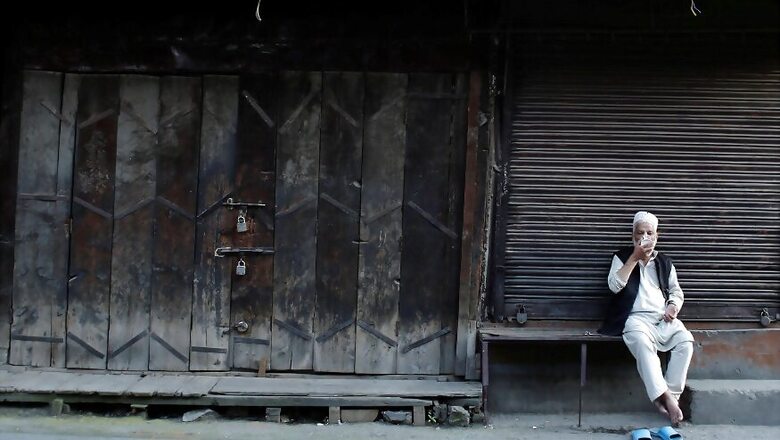
views
Sopore: Last season, Mohammad Subhan Dar sold a box of apples for Rs 800. This year, the same fetched Dar, an apple grower from Sopore in north Kashmir, Rs 150. He is distressed by the current state of affairs as he is aware that if business continues to remain as gloomy, he would not be able to repay his debts even till the next season. “An empty box costs Rs 80. After putting 15kg of apples in it, I am getting Rs 150,” says Dar, adding, “It is better that I throw the apples in the garbage. That will save me some money.”
The fruit mandi in Sopore which is second largest apple market in Asia, is wearing a deserted look. Over a hundred trucks are parked in the capacious compound of the mandi. Most of these trucks are parked here since last two weeks. The mandi, which dispatches around 300 million apple boxes on a daily basis to different parts of India, has managed to send a few thousand a day over the last couple of days.
A cow is eating away leftover apples at the platform that used to usually remain abuzz with people buying and selling their stock. This year, hardly any buyer from outside Kashmir has visited the mandi. The rates of apple have gone down drastically. As all other businesses, the rates depend on the supply and demand. But due to a communication blockade, apple growers have no idea about the prevailing market rates.
Jammu and Kashmir is under lockdown since August 5, the day when Union government revoked provisions of Article 370 of the Constitution that granted it special status and divided the restive state into the two Union Territories — J&K and Ladakh. Most of the senior top politicians, including three former chief ministers of the erstwhile state, have been detained. Internet connection and phone services, though restored, still continues to remain erratic. The markets are shut and curbs continued to remain imposed in Srinagar and other towns and rural areas of the Valley.
“Most of the fruit is going to Delhi because we have no idea about the market outside,” says a distressed grower, wishing anonymity. “This has created a situation where supply is more than the demand and the rates have gone down sharply,” he adds.
The apple season starts from the beginning of August and continues till mid-December. This is the time when pear and the early varieties of apple (Red-Delicious, Galamas, Razakwari) are dispatched. These are perishable varieties and have to be consumed within 24-36 hours after harvest. “We cannot cold-store the produce. It doesn’t have shelf-life,” says another grower, who has suffered losses worth lakhs.
With the current situation, transporters have started charging about a double of the usual fare, the growers complained. “Truckers are saying there is very less crop going out and traveling to and from Kashmir had an added risk,” says Fayyaz Ahmad Rather, another grower.
For transporters too, it is a loss of business worth lakhs. Soni Singh, a truck driver from the Gurdaspur area of Punjab, carries apples from Kashmir to different markets of India. Despite this being the best time to earn, he says there is no work for him. He has his truck parked at the Sopore mandi since August 3.
Had things been like before, he would have earned about Rs 3-4 lakh. Now, he plans to return home with an empty truck. Having made no money this month, Singh is worried that he would not be able to pay the monthly instalment for his truck.
Hundreds of labourers who used to work in the mandi are also jobless. “There are many local and non-local labourers who earn their livelihood here. But I am here from the last two weeks and there is no work,” says Nazir Ahmad Sofi, a resident of Dangerpora Sopore.
According to rough estimates, the Sopore apple mandi does business worth about Rs 15 crore a day in the peak season. This year, the traders say, things look bleak. Both the growers and traders expressed their shock at the government’s decision to abrogate the special status of J&K and blamed it for deliberately implementing such a move around this time of the year.
“The government knows that this decision will have terrible results in the Valley. They did it purposely and to hurt our economy,” says a grower, Shabir Maqbool, adding, “We didn’t suffer such losses during earlier agitations because there was not this sort of communication blockade.”
“The abrogation of special status will not only affect our business this year, but in future, big companies will try to take over our business,” Maqbool says, adding that he is ready to sacrifice his business if that helps restore Kashmir’s old status.
“We won’t work. We have been deceived by the government. This is nothing but a backstabbing,” he says. This year, the apple crop was expected to get better rates than previous years due to the increase in taxes. The growers were initially happy, but now they feel shattered.
The quiet in the otherwise busy market and the grim and angry faces of traders reveal the state of affairs in Kashmir that is going through several kinds of losses due to the clampdown and has left people in the state of shock.




















Comments
0 comment